Auschwitz survivors warn of rising anti-Semitism at 80th anniversary of camp’s liberation
Sign up now: Get ST's newsletters delivered to your inbox
Follow topic:
OSWIECIM, Poland - Auschwitz survivors warned of the dangers of rising anti-Semitism on Jan 27, as they marked the 80th anniversary of the liberation of the Nazi German death camp by Soviet troops in one of the last such gatherings of those who experienced its horrors.
The ceremony at the site of the camp, which Nazi Germany set up in occupied Poland during World War Two to murder European Jews on a huge scale, was attended by German Chancellor Olaf Scholz, Ukrainian President Volodymyr Zelensky, Britain’s King Charles, French President Emmanuel Macron, Polish President Andrzej Duda and many other leaders.
They did not make speeches, but rather listened for perhaps the last time to those who suffered and witnessed at first hand one of humanity’s greatest atrocities.
Israel, founded for Jews in the shadow of the Holocaust, sent Education Minister Yoav Kisch.
“We see in the modern world today a great increase in anti-Semitism, and it was anti-Semitism that led to the Holocaust,” said Mr Marian Turski, 98, who was sent to Auschwitz in 1944 and survived the westward ‘death march’ to Buchenwald in 1945.
“Let’s not be afraid to convince ourselves that we can solve problems between neighbours.”
‘Anti-Semitism spreading once more’
Retired physician Leon Weintraub, 99, who was separated from his family and sent to Auschwitz in 1944, warned of the dangers of intolerance.
“I ask you to multiply your efforts to counteract the views whose effects we are commemorating today,” he said.
Author and academic Tova Friedman, 86, said “80 years after the liberation, the world is again in crisis”.
“Our Jewish-Christian values have been overshadowed worldwide by prejudice, fear, suspicion and extremism,” she said, “and the rampant antisemitism that is spreading among the nations is shocking.”

Holocaust survivor Tova Friedman delivers a speech at the commemorations to mark 80 years after the Nazi German death camp’s liberation.
PHOTO: EPA-EFE
Anti-Semitic incidents have surged in part along with protests against Israel in many parts of Europe, North America and Australia since Israel launched its assault on the Palestinian enclave of Gaza after attacks on Israel by Hamas militants on Oct 7, 2023.
Mr Ronald Lauder, president of the World Jewish Congress, said on Jan 27 that hatred of Jews was rising against the backdrop of that war, adding: “Young people are getting most of their information from social media, and that is dangerous.”
Before the ceremony, which took place in a tent built over the gate to the former Auschwitz II-Birkenau camp, leaders stressed how important it was to preserve the memory of the Holocaust.
“The act of remembering the evils of the past remains a vital task, and in so doing we inform our present and shape our future,” King Charles said during a visit to the Jewish Community Centre in Krakow.

Britain’s King Charles lays a candle during commemorations to mark the 80th anniversary of the death camp’s liberation.
PHOTO: AFP
President Duda told reporters at the camp that, “We Poles, on whose land the Germans built this concentration camp, are today the guardians of memory”.
That remembrance of crimes committed in the name of Nazi notions of racial superiority has itself become an acutely political issue in recent years with the rise of far-right parties across Europe.
On Jan 25, billionaire Elon Musk, high-profile adviser to US President Donald Trump, made a video address to supporters
“Children should not be guilty of the sins of their parents, let alone their great grandparents,” said Mr Musk, who himself laid a wreath at Auschwitz a year ago. The rally prompted Polish Prime Minister Donald Tusk to say that “the words we heard from the main actors of the AfD rally about ‘Great Germany’ and ‘the need to forget German guilt for Nazi crimes’ sounded all too familiar and ominous”.
More than 1.1 million people, mostly Jews, perished in gas chambers or from starvation, cold and disease at Auschwitz, where most had been brought in freight wagons, packed like livestock.
More than three million of Poland’s 3.2 million Jews were murdered by the Nazis.
In all, between 1941 and 1945, Nazi Germany and its collaborators systematically murdered six million Jews across German-occupied Europe, along with gypsies, sexual minorities, disabled people and others who offended Nazi ideas of racial superiority. REUTERS

